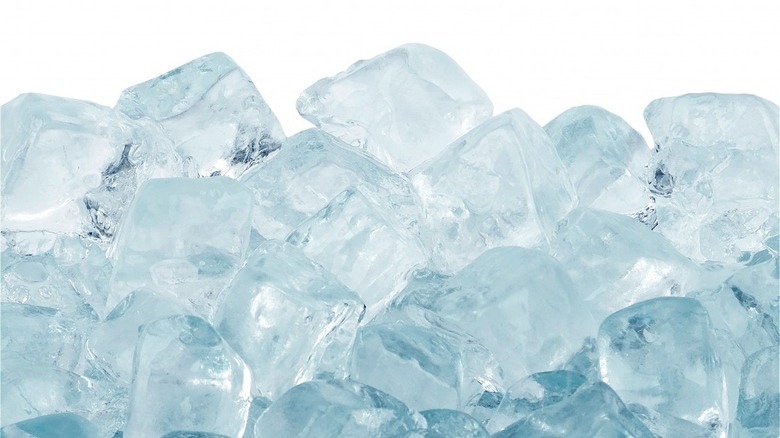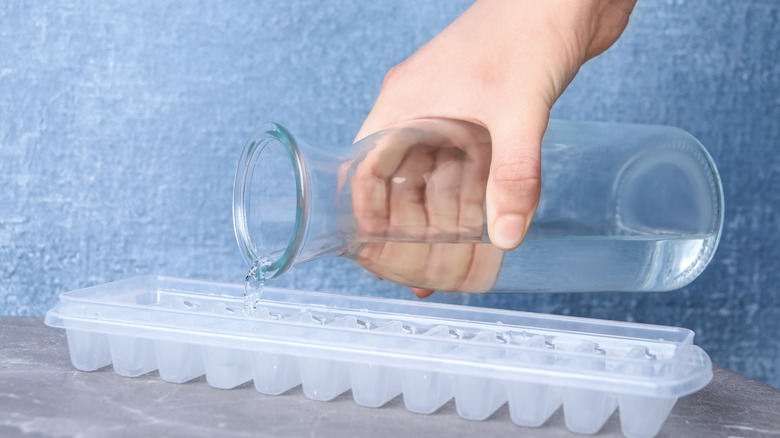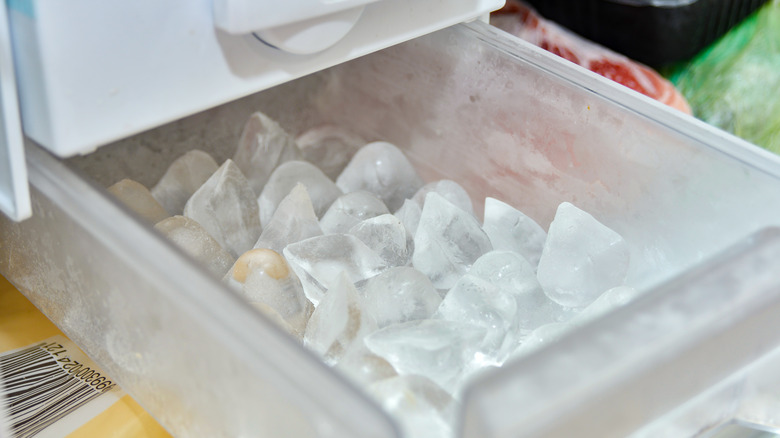Does Using Hot Water Really Make For Better Ice?
Ice is an ingredient that most of us don't think about because it can be made so easily and just plopped into a glass of Coke or lemonade. That is, as long as you have time and can wait for it to freeze into a solid cube. But people love the stuff and the proof is in the numbers. According to a press release published by Global Newswire, the home appliance company, Bosch, enlisted OnePoll to conduct a survey of people's ice preferences. The main conclusion: Americans are "ice obsessed," using about 400 pounds of it per person annually.
The study further revealed that 66% of respondents stop at the grocery store at least once a month for bags of ice, while 34% find themselves trekking to their local market three to five times a month to get ice. Making it at home can be so much more convenient. But if you're going to freeze your own ice cubes, should you use hot or cold water to accomplish the job? Some sites, like Food Hacks, claim that hot water freezes faster than cold water, citing what has come to be called the Mpemba effect. However, The answer, per Scientific American and Chemistry World, is not so simple.
Maybe use hot water, maybe not
There is information floating around on the internet about this slippery topic. So hopefully can keep your cool trying to wade through all of it. So first of all, what is the Mpemba effect? Chemistry World explains that it all started with Erasto Mpemba. As a teenager in Tanzania, he was learning to make ice cream at school by heating milk and sugar, letting them cool, and placing them in the freezer.
However, Mpemba placed the hot mixture in a freezer and found it froze quicker than when he allowed it to cool and put it in the freezer. He tried this experiment with boiling water and came to the same conclusion. The teenager partnered up with a physicist and published a paper, and the Mpemba effect became part of the wonderful world of science. However, there are some in the scientific world who say, "Not so fast."
For example, in 1998, Scientific American spoke with physicist Takamasa Takahashi, who claimed that normally, "hot water will not freeze before cold water but will freeze before lukewarm water." In his explanation, he linked the idea to the speed at which very hot water vaporizes, noting that "this phenomenon is particularly evident when the surface area that cools by rapid evaporation is large compared with the amount of water involved, such as when you wash a car with hot water on a cold winter day." However, the issue gets even more complicated.
Is there a final verdict?
Physicist Takamasa Takahashi told Scientific American that hot water might form ice faster than cold water if you place pans of cold and hot water in the freezer together. The amounts of water have to start off at the same mass, but the masses would change as evaporation and thermal contact take over. The heated water would begin vaporizing, making it less dense at the top. As a result, the cooler water at the bottom could turn into ice faster as the freezer works harder to remove heat. Meanwhile, "if water is cold enough ... then near-freezing water at the bottom will rise to the top" and away from the cold surface of the freezer during convection. But it's still not quite that simple.
Per Chemistry World, there are some different POVs on this topic. Some scientists have argued that what people call the Mpemba effect is the result of flawed measurement being misinterpreted. Experts also disagree on what it means for water to "[freeze] faster." To complicate matters more, freezing water is more involved than we think, making it difficult to control all the variables that could come to play. Different studies on the subject could be measuring different things. So is the Mpemba effect real? The scientific community hasn't reached a conclusion. This simply means if you are going to make your own ice, do your own experiment and see what you think freezes quicker.


